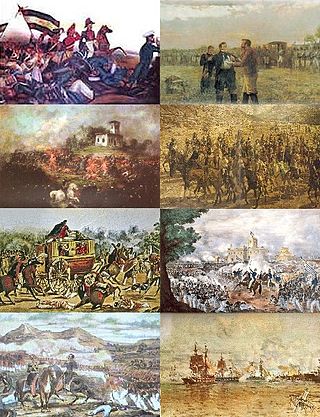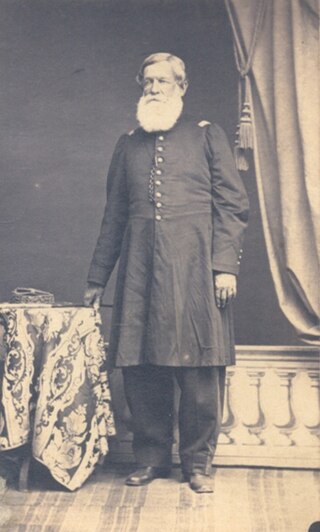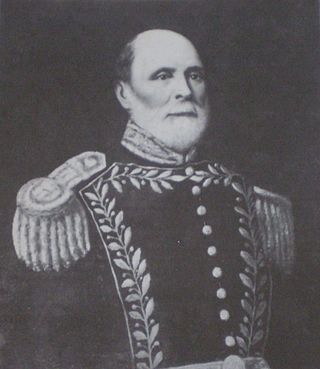| |||||
| Decades: | |||||
|---|---|---|---|---|---|
| See also: | Other events of 1866 List of years in Argentina | ||||
Events in the year 1866 in Argentina .
| |||||
| Decades: | |||||
|---|---|---|---|---|---|
| See also: | Other events of 1866 List of years in Argentina | ||||
Events in the year 1866 in Argentina .

The Argentine Confederation was the last predecessor state of modern Argentina; its name is still one of the official names of the country according to the Argentine Constitution, Article 35. It was the name of the country from 1831 to 1852, when the provinces were organized as a confederation without a head of state. The governor of Buenos Aires Province managed foreign relations during this time. Under his rule, the Argentine Confederation engaged in conflicts with Brazil, Bolivia, Uruguay, France and the United Kingdom, as well as other Argentine factions during the Argentine Civil Wars.

The Paraguayan War, also known as the War of the Triple Alliance, was a South American war that lasted from 1864 to 1870. It was fought between Paraguay and the Triple Alliance of Argentina, the Empire of Brazil, and Uruguay. It was the deadliest and bloodiest inter-state war in Latin American history. Paraguay sustained large casualties, but even the approximate numbers are disputed. Paraguay was forced to cede disputed territory to Argentina and Brazil. The war began in late 1864, as a result of a conflict between Paraguay and Brazil caused by the Uruguayan War. Argentina and Uruguay entered the war against Paraguay in 1865, and it then became known as the "War of the Triple Alliance."

Victorino de la Plaza was an Argentine politician and lawyer who served as President of Argentina from 9 August 1914 to 11 October 1916.

The Battle of Tuyutí was a Paraguayan offensive in the Paraguayan War targeting the Triple Alliance encampment of Tuyutí. It is considered to be the bloodiest battle ever in South America. The result of the battle was an Allied victory, which added to the Paraguayan troubles after the loss of its fleet in the Battle of Riachuelo.

Brigadier General José María Paz y Haedo was an Argentine military figure, notable in the Argentine War of Independence and the Argentine Civil Wars.

Ricardo Ramón López Jordán (1822–1889) was an Argentine soldier and politician, one of the last influential "caudillos" in the history of Argentina. He thrice rebelled against the government of Buenos Aires and was defeated in each attempt.

The Platine War was fought between the Argentine Confederation and an alliance consisting of the Empire of Brazil, Uruguay, and the Argentine provinces of Entre Ríos and Corrientes, with the participation of the Republic of Paraguay as Brazil's co-belligerent and ally. The war was part of a decades-long dispute between Argentina and Brazil for influence over Uruguay and Paraguay, and hegemony over the Platine region. The conflict took place in Uruguay and northeastern Argentina, and on the Río de la Plata. Uruguay's internal troubles, including the longrunning Uruguayan Civil War, were heavily influential factors leading to the Platine War.

Manuel Luís Osório, Marquis of Erval was a Brazilian military officer, monarchist and politician. A member of the Imperial Army at the age of fifteen, he climbed all the posts of the military hierarchy of his time thanks to the soldier attributes that consecrated him as "The Legendary". He participated in the main military events of the late nineteenth century in the Río de la Plata region and is considered a hero of the Paraguayan War. He was declared patron of the Cavalry Branch of the Brazilian Army in 1962.

The Argentine Civil Wars were a series of civil conflicts of varying intensity that took place through the territories of Argentina from 1814 to 1853. Beginning concurrently with the Argentine War of Independence (1810–1818), the conflict prevented the formation of a stable governing body until the signing of the Argentine Constitution of 1853, followed by low-frequency skirmishes that ended with the Federalization of Buenos Aires. The period saw heavy intervention from the Brazilian Empire that fought against state and provinces in multiple wars. Breakaway nations, former territories of the viceroyalty, such as the Banda Oriental, Paraguay and the Upper Peru were involved to varying degrees. Foreign powers such as the British and French empires put heavy pressure on the fledgling nations at times of international war.
Colonel José María Morales (August 14, 1818 – October 23, 1894) was a military officer and Afro-Argentine legislator who fought in the Argentine civil war and the Paraguayan War.
Below is the timeline of Paraguayan history.

Events in the year 1866 in Brazil.

The Battle of Boquerón was fought on 16 July 1866 and the Battle of Sauce on 18 July 1866, between an allied force of Uruguayans, Brazilians, and Argentines on one side and Paraguay on the other in the Paraguayan War. The Spanish-born Uruguayan officer León de Pallejas (1816–1866) and the Paraguayan officer Elizardo Aquino were killed in the battle.

Tomás Onésimo Canavery (1839–1913) was an Argentine Catholic priest and military chaplain, who served under the command of Bartolomé Mitre during the War of the Triple Alliance. He participated in most of the military actions against the Paraguayan forces, being promoted to lieutenant colonel in the same battlefield by order of General Juan Andrés Gelly y Obes.

Wenceslao Paunero was a 19th-century Argentine General, politician and diplomat of Uruguayan origin. He was born within the Banda Oriental and would go on to be a major member of the Unitarian Party. He was also the Minister of War and Navy of Argentina and the provisional Governor of Córdoba.

Manuel Hornos (1807-1871) was an Argentine general who participated throughout the Argentine Civil Wars and the Paraguayan War. He was known for his service at the Battle of Tuyutí where he was a major contributor to the Argentine victory at the battle.

The Humaitá campaign or the Cuadrilátero campaign was the third, longest and deadliest campaign of the Paraguayan War. The campaign lasted from 16 April 1866 to 5 August 1868. After the initial Paraguayan success in the Mato Grosso campaign and its failure in the Corrientes campaign, the armed forces of the Triple Alliance, Argentina, the Empire of Brazil and Uruguay, invaded the south of Paraguay. At a very short distance, they found the Paraguayan defensive device made up of four fortifications, the so-called "Cuadrilátero", which obstructed the passage to Asunción both by land and by the Paraguay River. A long series of battles cost huge numbers of casualties on both sides, with operations coming to a complete halt after the allied defeat at the Battle of Curupayty. Casualties on both sides were even higher from disease than from battle due to a cholera epidemic which was added to the appalling food and sanitary conditions.

Emilio Mitre was an Argentine Lieutenant General who participated in the Paraguayan War. He was the brother of Bartolomé Mitre and participated across the Uruguayan Civil War and the Argentine Civil Wars.

Ignacio Rivas Graces (1827-1880) was a Uruguayan-born Argentine Divisional General of the Argentine Civil Wars and the Paraguayan War. He was notable for being one of the main general who sided with Bartolomé Mitre during the Revolution of 1874 but when he was arrested he was discharged and after being pardoned, he was reincorporated into the Argentine Army in 1877.
Juan Bautista Charlone, born Pietro Giovanni Battista Chiarlone was an Italian-born Argentine Colonel who participated in the Uruguayan Civil War, the Argentine Civil Wars and the early to mid years of the Paraguayan War. He was known for being a major commander at the Battle of Tuyutí before falling during the Battle of Curupayty.